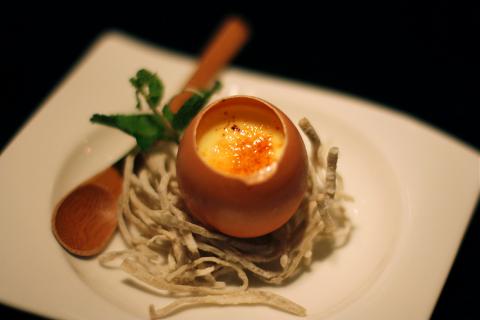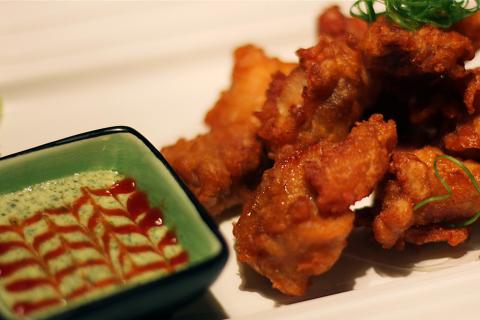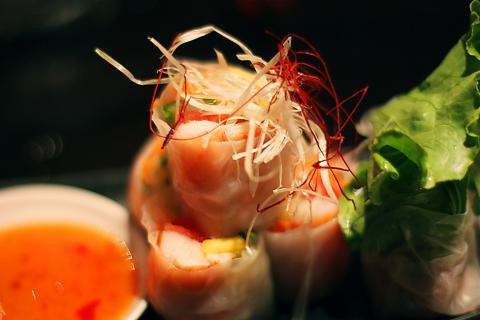A joint collaboration between music promoter Brown Sugar Live and Bagayalo Creative Workshop, Dozo Izakaya’s (Dozo創作和食居酒屋) cavernous space on Guangfu South Road (光復南路) near Civil Boulevard (市民大道) resembles an upscale nightclub, with dramatic lighting and sleek wooden walkways that will make you feel like a supermodel — unless your strut ends with a tumble into the sunken dining area or one of the surrounding booths.
You have to be extra careful if you order one of Dozo signature 4-liter Taiwan or Orion draft beers, which are served in tall glass dispensers. Other drinks from Dozo’s prodigious selection of alcoholic beverages include house cocktails like the surprisingly strong Mitsuwari peach (whisky, peach syrup, honey and soda, NT$200), or the sweet and sour samurai (shochu, whisky, triple sec and lemon juice, NT$200), Dewards, Macallan, Glenfiddich and Aberfeldy whiskies, champagne, and, of course, sake.
Dozo’s large menu is divided into 13 sections (with a table of contents in the front) and includes izakaya staples like sushi and grilled meats. The food, though not particularly innovative, is tasty and attractively presented.

PHOTOS: CATHERINE SHU, TAIPEI TIMES
To prepare yourself for that 4-liter draft beer, try Japanese fried chicken with tartar sauce (NT$180) or the skewered grilled beef (NT$190), which is wrapped around a large bundle of sliced scallions. Lighter treats include steamed mussels in sake broth (NT$260). Our portion included a paltry six mussels, but the shellfish were tender and juicy. Dozo’s signature Caesar salad with a hot spring egg (NT$200) has an interesting melange of textures, including jelly cubes made from soy sauce, a poached egg and croutons.
Presented like a work of art in a shallow wooden box, the seven-spices tuna tartar (NT$180, listed as “pate” in English on the menu) is one of Dozo’s most interesting looking dishes, but after the ingredients were mixed up and served on crispy romaine lettuce leaves, the tartar’s flavor proved to be disappointingly bland. Dozo’s sashimi plates and sushi rolls are basic but good. The grilled beef sushi roll (NT$220) is topped with fresh tender meat and peppercorns, giving it an unexpected kick.
Dozo’s dessert menu is tiny, but most of the treats are priced under NT$100 and as fun to look at as they are to eat. The creme brulee (NT$60), for example, is served in an eggshell on top of strips of crispy fried burdock. An ice cream dish for the same price is plated alongside a slice of sweet yam and ball of spun sugar. For parties, you can reserve a Black as Chocolate cake to be served after your meal. Revelers who want their sweet to come with a bite can order the Black Forest milk shake, which is made with blueberry liqueur, Kahlua and topped with chocolate ice cream (NT$280).

PHOTOS: CATHERINE SHU, TAIPEI TIMES

PHOTOS: CATHERINE SHU, TAIPEI TIMES

April 14 to April 20 In March 1947, Sising Katadrepan urged the government to drop the “high mountain people” (高山族) designation for Indigenous Taiwanese and refer to them as “Taiwan people” (台灣族). He considered the term derogatory, arguing that it made them sound like animals. The Taiwan Provincial Government agreed to stop using the term, stating that Indigenous Taiwanese suffered all sorts of discrimination and oppression under the Japanese and were forced to live in the mountains as outsiders to society. Now, under the new regime, they would be seen as equals, thus they should be henceforth

Last week, the the National Immigration Agency (NIA) told the legislature that more than 10,000 naturalized Taiwanese citizens from the People’s Republic of China (PRC) risked having their citizenship revoked if they failed to provide proof that they had renounced their Chinese household registration within the next three months. Renunciation is required under the Act Governing Relations Between the People of the Taiwan Area and the Mainland Area (臺灣地區與大陸地區人民關係條例), as amended in 2004, though it was only a legal requirement after 2000. Prior to that, it had been only an administrative requirement since the Nationality Act (國籍法) was established in

Three big changes have transformed the landscape of Taiwan’s local patronage factions: Increasing Democratic Progressive Party (DPP) involvement, rising new factions and the Chinese Nationalist Party’s (KMT) significantly weakened control. GREEN FACTIONS It is said that “south of the Zhuoshui River (濁水溪), there is no blue-green divide,” meaning that from Yunlin County south there is no difference between KMT and DPP politicians. This is not always true, but there is more than a grain of truth to it. Traditionally, DPP factions are viewed as national entities, with their primary function to secure plum positions in the party and government. This is not unusual

US President Donald Trump’s bid to take back control of the Panama Canal has put his counterpart Jose Raul Mulino in a difficult position and revived fears in the Central American country that US military bases will return. After Trump vowed to reclaim the interoceanic waterway from Chinese influence, US Defense Secretary Pete Hegseth signed an agreement with the Mulino administration last week for the US to deploy troops in areas adjacent to the canal. For more than two decades, after handing over control of the strategically vital waterway to Panama in 1999 and dismantling the bases that protected it, Washington has